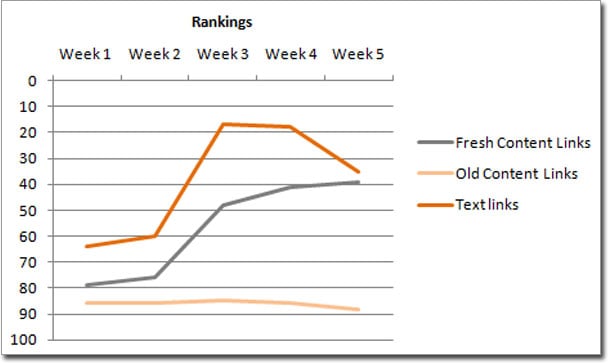
More Bang for Your Buck: Maximize New Links on Old Pages
The author's views are entirely their own (excluding the unlikely event of hypnosis) and may not always reflect the views of Moz.
We know that different links pass wildly different values for SEO purposes. Sometimes you build links that shoot your website to the top of the rankings, while other links are worse than worthless. The value of a link varies according to different factors, including:
- Internal vs. External Links
- Authority and Trust of the Linking Domain
- Position of the Link on the Page
- Alt Attributes vs. Text Links
- ... and many other ranking factors.
What happens when you build new links on old pages? Often when link prospecting, we SEOs look towards older, high-authority pages for link targets. Do these links pass the same value as links from brand new pages? In this week's Whiteboard Friday, I discuss why Google may treat these links differently, and provide 3 solid strategies for maximizing the value of all your new links, on all types of pages.
Video Transcription
Howdy, SEOmoz fans. Welcome to another edition of Whiteboard Friday. My name is Cyrus. I'm an SEO Consultant. I'm also an associate here at the world-famous SEOmoz. Today we're talking about links. Now this is a little advanced SEO, but it's such a simple concept and so fundamental, it's going to change the way you look at your link prospecting in the future.
Here's a situation. You're dying to get this link. You've got this new page and you want to get a link to it. So you've got this old page sitting around on your site. It's got plenty of authority. It's got high PageRank. It's perfect. It has a lot of incoming links. And so you just put a little link to your new page.
You're really excited. You wait a few weeks and nothing really happened. You don't see the boost in traffic. It's kind of like you didn't even do anything.
This works for external links as well. You've been link prospecting, and you find this great old page that you want to get a link from. The webmaster agrees and he puts a little link. Again, you wait and nothing really happens.
I've noticed this over the years, and I've talked to other link builders who have noticed this phenomenon, that links from old pages don't always seem to have the oomph as a link from a brand-new page. We're wondering is there anything that you can do about this.
A guy by the name of SEOWizz, Tim Grice, who is over in the U.K., did a study about this. I'll link to it in the post below. He built a bunch of old links on old pages, and he built a bunch of similar new links on new pages. He compared the two. He compared the boost in rankings between those two, and what he found was this exact same thing, that the old links that he built just didn't raise his rankings as much as the new links he built. He concluded that old links just weren't worth it anymore.
SEOWizz: Old Content Links vs. New Content Links
Source: Links In Old, Crawled Content Don’t Pass Weight
What do we mean by an "old page" when we talk about these old pages? From a technical, Google definition point of view, we're talking about something that has been previously crawled and indexed by Google. Stale content, by stale we mean content that hasn't been updated in a long time. It was written and it just stayed that way. There are no new blog comments. It has just been for two or three years the same way it was written. And old links. So this old page, all of the links that it got, it got years ago or months ago, and there are no new links coming in. That's what we're talking about when we talk about an old page. If it doesn't meet these definitions, then it's a new page.
Why would this happen? Why would Google care if it's an old page or a new page? We don't know exactly, but we do have some hints from some patent filings that Google has filed, specifically, Document Scoring Based on Document Content Update. It's been filed over and over again in different variations throughout the years. It's kind of like the manifesto of how Google runs its search engine. It's well worth a read. I'll also link to that in the content below.
Basically, in there, there are a couple of paragraphs in that most recent patent filing that talk about scoring a document based on the amount of change in a document. What Google is trying to do here is ignore minor edits. If you are making just a small link on that page, that qualifies as a minor edit. Google wants to ignore that because that could look kind of fishy, kind of scammy, kind of like you are doing some link manipulation or maybe you're buying links.
"In order to not update every link's freshness from a minor edit of a tiny unrelated part of a document, each updated document may be tested for significant changes... and a link's freshness may be updated (or not updated) accordingly. "
- Google's US Patent Application
What Google is looking for is not so much what changes, but how much changes and how many parts of the document change. This leads to a few solutions as to how we can address this problem of the old links in the new pages.
Now, I want to be clear. These links still pass value. Should you be building these links? Absolutely, but we want to make sure that we're getting as much oomph out of them as completely possible.
Let's look at some solutions to make sure that we're getting as much value out of these new links and old content as we possibly can. The first idea is that if you're going to update the link, it's a good policy to update the content around the link. Don't just change or add a little text link at the bottom of the page. Why are you adding that link? That's what Google is asking. Why is this changing? If you're changing the paragraph, the content, the surrounding text around that, that means this is new information, this is worth paying attention to, and Google is going to pass much more value from that link.
While you're updating that, don't forget the title tag. If you're updating the content, this is a perfect time to re-eval your title tag. That's another freshness signal that Google is going to use in order to evaluate how important this change is and how significant it is.
If you're building external links, this is on an old website, it used to be a broken link, and you convinced a webmaster to update it to point to your site, don't just have them update the link. Give them some information about your site. Give them as much content as you can to add to his content so that content gets updated as well. The more changes, the more significant the change, the fresher this is going to appear and the more that little link is going to count. It's going to start to look just like a fresh link in the eyes of the search engines.
What if you can't control this? What if that webmaster says, "No, I'm just adding a link," and you can't really get him to update any of the content? Well, you still have some options. The main one you can do is take that old page that you don't control and start building new links towards it. That way, the link to your site is going to count a little bit more because that page is going to appear fresher in the eyes of the search engine. Just build some third-party links - they're called bank shots in the link building world - and that's going to pass more value. They do a tremendous job of helping that link seem more relevant.
On the same token, social signals. If you start tweeting, sharing, getting this page shared in your social circles, those are going to be more freshness signals for Google to look at. It's going to appear more fresh.
And D, all of the above. Do whatever you can to make this old page as fresh as it can be and get as much relevance out of that link that you possibly can.
The final option would simply be to just build a new page. Get new pages and new links, diversify your link profile. Regardless, we want you to get as much value out of all the links that you build.
That's it for today's Whiteboard Friday. If you're a link builder, if you have experience with this, please share your thoughts in the comments below. Thank you.
Video transcription by Speechpad.com
Next week on Whiteboard Friday: We'll be covering Google's "Search Plus Your World" and what it means for search marketers.




![How to Create an SEO Forecast [Free Template Included] — Whiteboard Friday](https://moz.rankious.com/_moz/images/blog/banners/WBF-SEOForecasting-Blog_Header.png?w=580&h=196&auto=compress%2Cformat&fit=crop&dm=1694010279&s=1a76a7c52ec3cdfe4e321bf5dae6894e)
Comments
Please keep your comments TAGFEE by following the community etiquette
Comments are closed. Got a burning question? Head to our Q&A section to start a new conversation.